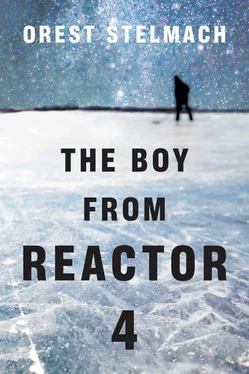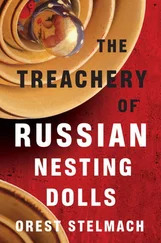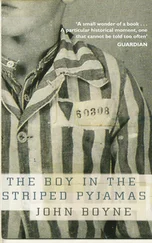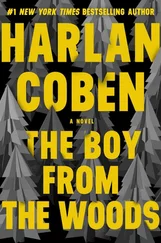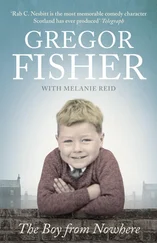Nadia had a flash of her uncle Damian. “What? Why do you say that?”
“Because it’s true. Ukraine itself has been conned for the last one thousand years. In 988 AD, Genghis Khan’s grandson, Batu, broke a treaty and decimated Kyiv. In the next five centuries, the Liths and the Poles took turns exploiting the countryside. The Russian Black Hundreds killed anyone who wasn’t Tsarist, and the Soviets brokered a truce and then tried to wipe all trace of our culture off the face of the earth. That is why Ukrainians are the world heavyweight champions of the long con. They’ve had more than ten centuries of training.”
Nadia and Anton continued chatting about all things Ukrainian. For Nadia, it was another surreal moment: a casual meal and conversation in her parents’ native language with an actual native. When they finished their vareniky and beer, they split the bill.
“How is your jet lag?” Anton said as they walked to his car at ten fifteen. “Would you like to go to a club? An underground music club? My friend Radek is playing tonight. He has a great thrashabilly-psychobilly band. It’s called F in Mathematics.”
Nadia’s brain was floating in a fog. “No, thank you. I think I’ve had enough psychobilly for one day. Maybe another night.”
“How about dessert? You must have some Kyivan dessert. You like chocolate, Nadia?”
The magic word stifled her protestations.
Fifteen minutes later, they were seated at the mahogany bar in Café Éclair. Light jazz music played in the background. The air smelled of rich cocoa.
“I love this place. Look, the candles are made from chocolate,” Anton said. “Imported from Belgium.”
The menu featured sixty-five different desserts, including enough mousses and meringues to satisfy all the monarchs of France. Nadia ordered a decaf cappuccino and a petite slice of tiramisu cheesecake. Anton asked for a double espresso.
“Besides your cousins in Bila Tserkva,” Nadia said, “you have family?”
“My parents died when I was young. I was married for two years, but my wife died in ’05. She was an intellectual from Lviv. She helped run the Pora youth group that built the grassroots support for Revolution Orange, when we overturned the fraudulent presidential election.” He paused until Nadia nodded, showing she knew about it. “How about you?”
“I have a mother and a brother. My father’s dead. And I was married, too, but my husband died in a car crash a while back. He was a professor like you. Religion was his field.”
They talked about their spouses until a waiter delivered their coffees.
“So why did you call me, Nadia?” Anton said. “Not that it matters. We love Americans in Ukraine, and it’s my privilege to meet you. I enjoy our conversation very much.”
Nadia studied his earnest expression. The concierge at Hotel Rus had helped her find the website for Kyiv Slavonic University. Anton Medved really was an assistant professor of sociology, and his picture confirmed his identity. She decided she could trust him.
“I’m looking for someone,” Nadia said.
“Who is this person you’re looking for? I know people who know people who know a lot of people.”
“I’m looking for an uncle I never knew. But first, I have to find a woman who knows his whereabouts. To find her, I need a friend who knows Kyiv.”
Anton spread his arms out and pointed at himself. “Who is this woman? What is her name? You have an address?”
“I have a name, an address, and a phone number. Problem is, I went to the address today, and the super told me she doesn’t live there anymore. And the phone number belongs to a beauty salon. Which really doesn’t make sense, because supposedly she was waiting for me to call her.”
“Huh,” Anton said, nodding. “You have the number?”
“Yeah, hold on.” Nadia pulled her borrowed cell phone out of her purse and read from the memory. “Two-four-four, three-six-eight-three.”
Anton stared at her and blinked. “What about the city code?”
“She lives in Kyiv. It’s forty-four, right?”
“That depends.”
“What do you mean, it depends?”
“If it’s a Kyivstar mobile phone, it’s sixty-seven.”
“What?”
“Everyone thinks there’s only one city code for Kyiv. That’s not true. If that number is a cell phone and it’s Kyivstar, the city code is sixty-seven. Not forty-four.”
Nadia realized that she and her mother had been dialing the wrong number. “Is it rude to make a call in here? Should I go outside?”
Anton waved his hand. “Please. Make your call. It’s too dangerous to step outside. The temptation for you to smoke pot or buy cocaine will be overwhelming.”
Nadia was busy dialing, so she didn’t realize what he had said until after the phone started ringing. She chuckled belatedly and held her breath.
One ring, two rings, three rings, four. Five rings, six rings—pause. A commercial female voice greeted Nadia in Ukrainian: “The party you have called is unavailable. Please leave a message at the tone.”
Nadia left an urgent message in Ukrainian. Afterward, she called back and left the same information in English.
When she hung up, Anton beamed at her. “Good?” he said.
Nadia shrugged. “I’m not sure. I hope it was her and not someone else’s phone.”
“I was just thinking that if that wasn’t the right phone number, we can go to her apartment and I can talk to that super for you. A local might have more luck, you know?”
“Thanks. Let’s hope it doesn’t come to that.”
“I think it’s her. Everyone uses cell phones these days. Relax. It’s like I told you. This is Kyiv. Things will get better.”
Nadia smiled and thanked him. She took a bite of her cheesecake. The coffee-flavored mascarpone melted in her mouth. She hadn’t found Clementine yet, but she was closer to the money today than yesterday, and she’d made a friend. She was in a foreign land, but she felt as though she was visiting her second home. There was ample reason to be optimistic.
An engine wailed. Nadia glanced out the window, but the vehicle disappeared before she could see it. The sound was a sobering reminder, however, that a man in a black Porsche was tailing her. His ultimate job was to kill her. Nadia refused to succumb to fear. Emotions could only interfere with her agenda. If she found the treasure, she’d have something they wanted. She’d have resources to find a way home. Still, the echo of those words was a promise that, regardless of what they said in Kyiv, things were going to get worse before they got better.
CHAPTER 25

NADIA SLEPT FITFULLY for seven hours, bolting upright every time she heard a noise in the hallway or next door. Her subconscious feared any one of them might be the phone call she was waiting for. They weren’t. By 11:00 the next morning, she couldn’t sit still anymore. She put on a light coat and hiked down Khreschatyk, Kyiv’s primary north–south boulevard.
During World War II, she remembered from her classes, the Soviet Army had mined Khreschatyk with explosives as it retreated from Kyiv. When the Nazis arrived on September 19, 1941, Red Army commanders detonated the explosives using radio signals from over four hundred kilometers away. More than three hundred buildings were demolished and one thousand troops killed. The Nazis responded by executing twenty thousand Kyivans. It was the first use of long-distance radio signals to trigger explosives in history.
Clouds hung low on a bitter, overcast morning. The air smelled of flowers and gasoline fumes. Bumpy cobblestone promenades for pedestrians and small-vehicle parking flanked cafés, stores, and restaurants. Ornate Stalinist facades adorned an eclectic assortment of government buildings.
Читать дальше
